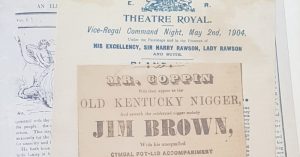By Neville Buch
Disclaimer: The views expressed herein are solely those of the author and do not claim to represent the Professional Historians Association.
The economy, or more precisely, economic value, works differently among members of the Professional Historians Association. Those members who are academics are paid by universities primarily to teach and to gain future research funding by delivering research outputs, mainly publications which will count in Excellence in Research for Australia (ERA) evaluations. Actually producing history professionally is a by-product in this particular facet of the economy. Other members are employees of government entities. As public servants, they may have the role of historians but they must perform dissimilar bureaucratic duties for which they are also paid to do. A few members are consultants in the employ of private companies, and others are freelance consultants. These members are paid to complete historical projects but are subject to the demands of the market, and many times the market doesn’t want or offer terribly much.
Be it as it may, many members are often engaged with local history organisations. Whether as academics, public servants, consultants, we work alongside volunteers, writing and researching local history, and a recent enquiry has got me thinking on the larger issue of the economics of our combined voluntary-professional endeavours in the local history industry; not only for my purposes as a professional historian, but in fairness to what membership in a local history association is worth for everyone involved.
I had a call from a gentleman as a contact point for my local history group. It is a story not unfamiliar to our PHA members. He wants to know historical details about his property, a site with connections to the emergence of the suburb in the 1880s. At one level, the conversation involved many things where I could easily assist as a volunteer in a voluntary local history group. At another level, the conversation was moving in another direction. In this case the gentleman thought that the local railway station had originally been in a different location to its traditional situation, based on a drawing in the estate advertisement of 1886. I suspected that it was simply a matter of the drawing not being to scale, and crafty estate agents wanted to make the station look closer to hand. However, without verifying evidence I needed to keep an open mind. Nothing was mentioned in the local history publication. It was a fairly easy thing for me to take a trip to the Queensland State Archive and search the railway plans for the period, but make no mistake, this is professional work. Should I offer the gentleman what he was expecting – someone to go off and give him an answer free of charge? Who am I doing the work for, for the local history group, for the gentleman, or for my own curiosity?
The difficulty is that local history, as indeed family and institutional history, has become a commodity, as well as retaining a non-commercial value to the community at large. And each local history group is also part of that economy. Even though, it is a non-profit organisation it has to cover the costs of the work that everyone puts in, and it should provide nominal recognition for members’ contributions. Making history a commodity is nothing new and nor is it necessarily a bad thing. For decades, local history publishers have been a small cottage industry, and professional historians need to be able to sell their labours at a fair price. This is not new. What has changed is that, with increasing number of providers, particularly online providers, history has become a self-service commodity. Providers charge a membership fee that provides access in which anybody can be a do-it-yourself historian (a “DIY historian”). Again, this is not necessarily a bad thing. The problem is that it makes it difficult for the professional historian to understand where she or he stands in the new emerging economy. Is there a role for the professional historian in this open-to-all type of market?
It is troubling for the professional historian, but I believe it is trouble for local history groups, in the mix of voluntary-professional roles, unless there is clarity about the input local history association’s offer to the economy. Too often a member of the public will call and expect information to be freely provided which requires someone to locate the primary source, make a trip to a depositary, and provide an answer in form that often taxes some thought. Someone has to pay in the end. We all end up paying for the services of the libraries and the archives through taxes and rates. We do want members of the local community making enquiries. Local history groups don’t want to discourage that, but there is a cost to each group member and the problem is that the value of that cost diminishes in the wider society because it hasn’t been given sufficient economic value.
The point is that local history groups should not be too easy in dispensing with unpublished research work free of any charge. Many local history groups recoup something from the cost of their publications, and that should apply equally to when private interests require information that is gained from extensive archival work. It is a quiet different matter if it is providing information from easily-accessible sources, and little work is required; a chat on the phone and a quick check online or in at-hand hardcopy publications. To expect additional research work free-of-charge which is requested for private ends, as was the case of my recent enquiry, is the dark-side of voluntarism where ‘professional’ labour is exploited. Certainly there is self-interest for me as the professional historian, but the matter applies to other members in the local history group who often offer other types of professional roles. In my own group there is a professional writer who is well-known for her local history work. Local history groups can have members who are history teachers and those who are graduates in local history studies or women’s history, and who are not members of the Professional Historian Association. All together, whether a professional historian or not, there are members of a local history group who profess skills, training, and experience which is very expensive in our economy. And unfortunately, the public and the state don’t value that cost.
It seems to me a solution lies in how freely research outcomes are shared. It should be freely shared among members. With the agreement of mutual exchanges, it should be freely shared among other local group memberships within History Queensland. It should be utilised for group publication for a cost where funds go back to the group. And when members of the public make requests for information for private use then research outcomes, beyond what is published, should incur a charge. I am inclined to think that a small percentage of the charge be returned to the researcher(s) involved, but perhaps members feel that their labours are a voluntary contribution to the group. I am happy to leave this last thought as a mooted point.
The challenge, though, is not simply with individuals. Larger institutions can also expect too much of voluntary organisations and provide too little in return. What if schools expect local history groups to provide time and effort in provision for their students’ local history units as part of the new national curriculum? That troubles me if it is simply freely provided, when there are poor funding opportunities available to local history groups. The state benefits, but local history groups are made poorer and are required to provide a service free of charge. It is not simply a matter of monetary exchange. It is that there is no benefit for the local history groups. The students will do their projects, and the local history groups are then forgotten. Nothing has been given back in return. Again, there is the dark side of voluntarism, exploiting professional labour without proper compensation. It would be different if there was some type of exchange in kind, so that there were clear benefits to the local history group to the approximate value of what the school gets in the support for teaching their local history units.
Like the subject of economics itself, it gets complex. However, there is a need for an agreed understanding, on the part of the local groups, the state, and the general community, that voluntarism can only go so far, and that cost of professional history work, whether accredited or not, still needs to be paid. Otherwise we will all be poorer in the end.


